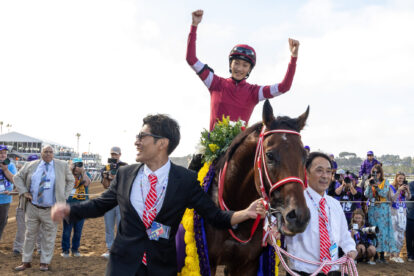The prodigious Forever Young has shattered precedents and skeptics alike by romping to glory in the 2025 Breeders’ Cup Classic to claim a first-ever victory for Japan in America’s most lucrative race. In an electric instant, the four-year-old delivered not just a win, but a seismic statement.
The Japanese thoroughbred was already a hardened world traveler, but he now heads home to the Land of the Rising Sun on the back of a campaign few could dream of—a dazzling coup in the eight-figure Saudi Cup, as well as a tenacious third in the Dubai World Cup. The strategy from trainer Yoshito Yahagi was elegant in its simplicity, ruthless in its execution: cherry-pick the richest stages, learn from near-misses, and arrive at Del Mar at the absolute peak.
At last year’s classic, Forever Young had chased the shadows of both Sierra Leone and Fierceness, ultimately powerless to resist the two Americans and forced to settle for third. This year, many thought he awaited a similar fate as Kentucky Derby and Belmont Stakes winner Sovereignty was positioned by online betting sites as the short-priced favorite to leave Del Mar with the crown.
However, Bill Mott’s prized asset was scuttled by a fever on the eve of the race while positioned with the popular Bovada horse betting site as the 6/4 favorite, sending oddsmakers scrambling. That opened the door for last year’s two frontrunners, the dangerous Journalism, and of course, Forever Young. Ultimately, the latter would bulldoze that door through.
Forever Young’s Crowning Moment
The race itself was one in which the eventual winner would have to bide his time. Ryusei Sakai in the saddle was acutely aware of that, and as the horses turned for home, the Japanese jockey remained patient before pulling the trigger and accelerating away from the chasing pack. Behind, the ice-cold Sierra Leone set off in pursuit, fearing that his hopes of successfully defending his crown were slipping away. On their inside, Fierceness looked for daylight, his own juvenile glory now a memory under siege as Del Mar held its breath.
Despite coming under assault from all angles, Forever Young refused to yield, prevailing by a razor-thin half-length and stopping the clock at 2:00.19. The raw numbers: 10 wins in 13 starts, earnings scarcely believable, Group 1 silverware gleaming from Riyadh to Tokyo and now—finally—Del Mar. “This is like if the Japanese team won the World Cup,” Yahagi declared, blinking back the years of near-misses, what-ifs, and the country’s relentless climb.
Forever Young’s feat isn’t merely historic in Japan; it’s statistically staggering across the arc of the Breeders’ Cup Classic, a race constructed not just on American soil, but in the crucible of American bias toward homegrown, home-trained muscle. Only a rare few have crossed the ocean to win this battleground. Make no mistake: when a foreign flag is raised in the Classic, it signals a paradigm shift. But which champions have seen their flags raised? Let’s take a look.
Invasor – Argentina
To find a precedent, rewind to Churchill Downs, 2006—a year the American hype machine anointed Bernardini as invincible. Enter Invasor: Argentine-bred, Uruguayan-polished, UAE-sharpened. No American narrative fit; no media darling status. But from the gate, teenage jockey Fernando Jara exuded preternatural calm.
When Bernardini sprinted, Invasor waited. When Bernardini reached for destiny, Invasor closed—and conquered, winning by a length in 2:02.18. The stats: a near-perfect 9 wins from 10 starts, millions in career earnings, and newly minted Horse of the Year. Invasor’s path—South America to the Middle East to North America—was a masterclass in international intent. He didn’t just compete in the world’s richest races; he left a string of broken favorites in his wake.
Black Tie Affair – Ireland
Flip further back to 1991 and you’ll meet a legend forged far from American bluegrass: Black Tie Affair. Irish-bred, Chicago-trained, and possessed of front-running stubbornness that bordered on defiance. Entering the Classic on a five-race tear, he left nothing to chance—wiring the field under Jerry Bailey and withstanding every late thrust.
The stats were unsparing: 18 career wins, plenty of prize money in the bank, the previous year’s sprint disappointment banished by Classic glory. His Eclipse Horse of the Year was as much for personality and story as for time in the winner’s circle—a reminder that resilience is sometimes a bigger factor than speed.
Raven’s Pass – Honorable Mention
Yet, if you think the Classic always bows to dirt trailblazers, consider 2008. Santa Anita’s Pro-Ride synthetic brought a tempest of debate, but it also opened the door for a horse that, while American-bred, had never set hoof in U.S. soil until this day. Raven’s Pass, trained by John Gosden and piloted by the mercurial Frankie Dettori, stalked the field before unleashing a devastating late kick.
Reeling in European ace Henrythenavigator, then gunning down Curlin—the reigning American monarch—Raven’s Pass stopped the clock at 1:59.27, a track record. While purists may quibble about the surface, the truth rings clear: adaptability, speed, and courage cross all boundaries.


